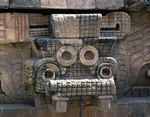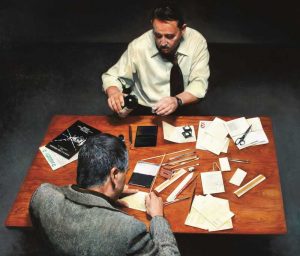There are numerous significant events that stand out from the era of discovery of the Americas. One event in particular is Hernando Cortés and his group of six hundred men conquering the Aztec Empire. One might ask how this conquest was possible? How was a small number of men able to conquer an entire empire? One factor that contributed to the Spanish conquest was the disease smallpox; however, there was another variable as well. The Aztec emperor Montezuma mistakenly believed Cortés to be Quetzalcoatl, an all powerful Aztec god who had promised one day to return to his people.1 So who was this supposed almighty god and why was Cortés believed to be him?

Quetzalcoatl, though most famously known for his relation to the Aztec religion, was actually acknowledged long before the Aztec civilization. Quetzalcoatl’s believers stretched all over Mesoamerica after the fall of Teotihuacan.2 Teotihuacan was a prehistoric city located in Central Mexico. The city arose around the first or second century BCE and fell around the 600s or 700s.3 The information regarding the civilization residing inside of Teotihuacan is still not fully known due to outside elements such as weather and other tribes who may have resided or passed through the area. The exact reason for the destruction of the city is still unknown. Although, archaeologists speculate the downfall was caused by a rapid decline in population.4 In accordance with Aztec legend, Quetzalcoatl had traveled from the east and elevated the Aztec empire by teaching them how to grow crops, develop architectural structures, and create tools with medal. He also helped construct the Aztec calendar. When an unknown rival tribe had surfaced, they drove Quetzalcoatl away. Before he left, Quetzalcoatl promised one day to return and save his oppressed people.5 Quetzalcoatl’s deity is represented as a feathered serpent.6 He was understood to be the god of learning and the patron of priests.7 Quetzalcoatl’s forthcoming was suspected to be around the same time as Cortés’ arrival.8

Scholars have attained an impressive amount of knowledge from ancient Aztec documents. According to their discoveries, the Aztecs proclaimed various omens of warning, which occurred just before the arrival of the conquistadors. Such omens included: an unusual amount of stars and comets in the sky, a sacred temple caught on fire, and the water on the lakes and rivers seeming to boil. All of these signs and the belief in the soon return of their god Quetzalcoatl, made it easy for the Aztecs to presume that Cortés was their long awaited god. Upon Cortés’ arrival, he was greeted with jewels and an assortment of gifts. When Cortés soon realized who the Aztecs deemed him to be and the influence his mistaken identity could produce, he was quick to use this opportunity to gain Montezuma’s trust, knowledge, resources, material objects, and even his fear. With their own emperor in a state of dismay, the rest of the Aztec people arose in a state of hysteria. This made it possible for Cortés and his men to manipulate the Aztecs, and profit from them what they wanted while they could. Eventually, Montezuma’s mistake led to the conquest of his entire empire.9
The Aztecs’ religious beliefs were fundamental attributes to their civilization. It was a unique quality which made them their own empire. In this particular circumstance, it was also a cause for their destruction. The Aztecs wholeheartedly believed their god Quetzalcoatl was partly responsible for the development of their civilization. Many Aztecs also truly believed Cortés was the return of their beloved god. Unfortunately for the Aztecs, their faith contributed to their conquest.
- Sara E. Cohen, “How the Aztecs Praised Montezuma,” Society for History Education 5, no. 3 (March 1972): 24-26. ↵
- Michael E. Smith, “Aztecs,” in The Oxford Handbook of the Archaeology of Ritual and Religion., by Rowan, Yorke M., ed. Timothy Insoll, vol. 77 (Arizona State Unversity, 2011), 563. ↵
- George L. Cowgill, “State and Society at Teotihuacan, Mexico,” Annual Review of Anthropology 26, no. 1 (October 1997): 129-130. ↵
- George L. Cowgill, “State and Society at Teotihuacan, Mexico,” 156. ↵
- Sara E. Cohen, “How the Aztecs Praised Montezuma,” 24-26. ↵
- Michael E. Smith, “Aztec Culture: An Overview” (Arizona State University, 2006), http://www.public.asu.edu/~mesmith9/1-CompleteSet/Smith-AztecCulture-WWW.pdf, 5. ↵
- Michael E. Smith, “Aztecs,” 563. ↵
- Sara E. Cohen, “How the Aztecs Praised Montezuma,” 24-26. ↵
- Sara E. Cohen, “How the Aztecs Praised Montezuma,” 24-26. ↵



65 comments
Claudia Sanchez
Such a sad story of manipulation by Hernan Cortez. Although I knew of the fall of the Aztec empire I hadn’t known that a part of it was because they trusted Cortez as the Quetzalcoatl. Although it seems rather poetic that the reason for the flourishing empire was also the reason it was ended. overall great article!
Fatima Navarro
The Aztecs were such an important part of Mexico and its roots, they were also huge and so powerful, yet they also left behind many rituals that were savage if looked with the lens of today. The Aztec peoples’ history is so interesting, and even though this article was short, it was still able to get that point across of who Quetzalcoatl was and why he was so important for the Aztecs and how he shaped a culture of the indigenous people that are still alive today in Mexico.
Matthew Swaykus
The article did a good job informing the audience about the influence of this once prestigious deity, but not as good a job in entertaining. Of course, this is just my opinion yet I feel that the article could have been written better if given more resources and time. On the other hand, that may be exactly the problem. We have so little in the way of records about the ancient Mesoamerican societies and cultures besides whatever survive their conquest.
Also, if the author is reading this, please check your grammar for the second paragraph.
Eric Ortega Rodriguez
I find it bizarre how the timing of Hernando Cortés was perfecting timing with the time that Quetzalcoatl was supposed to return. The Aztecs must have been very profoundly tied to their beliefs since it was the reason that their lives were lost. This is the first time I hear about this and this article made me want to look up more information regarding The Aztecs. Overall, very good topic selection. Good work.
Oscar Ortega
This Article was very direct in its information. It told the famous story of Cortez’ conquest of the Aztecs succinctly, and focused primarily on the less-known information first regarding Quetzalcoatl in Aztec religion, and his role as a benevolent god, and the fact that Cortez was mistaken for that god. This article is ideal for anyone who wants or needs to learn a bit more about Cortez and his conquest of the Aztecs, or the Aztecs in general, as it’s reasonable length and excellent detail make it an easy but educational read.
Christopher Hohman
Nice article. The fall of the Aztec empire was tremendous event in world history. And the Aztec religion played a huge role in their downfall. They really believed that Cortes was the physical embodiment of their most important god. That is unfortunate that they felt that way because perhaps if they had been more careful then they would have been able to expel the Spanish. Then again disease especially smallpox might have destroyed the empire anyway.
Raymond Nash Munoz III
This article was very short, sweet, and to the point of the overall story that the author wanted to convey. For me, the short and straight forward articles are the best, especially when your looking to diversify your general knowledge. Aside from the general historical knowledge, I came to the conclusion that faith can be a very powerful thing, but completely blind faith without any hindsight is a dangerous practice to adopt.
Sofia Andrade
In history I learned about how Montezuma and the Aztecs made a mistake by thinking Cortes was Quetzalcoatl. One reason I recall being taught for this mistake was Cortes different in appearance such as his light skin and colored eyes. I did not know of all of the other signs that the Aztecs were experiencing as confirmation of the coming of Quetzalcoatl.
Sebastian Carnero
Interesting article. I didn’t know Quetzalcoatl was the god of learning and that the faith in Quetzalcoatl was the downfall of the Aztec Empire. One very interesting detail was that Quetzalcoatl was known before the Aztec civilization. Given all the things they received from Quetzalcoatl (Crop growth, tool making, architecture, the creation of the calendar), it makes sense how grateful they must have been with him.
Luke Lopez
This was a very interesting article on the Aztec god Quetzalcoatl and Hernan Cortes. Hernan Cortes was assumed to be the god Quetzalcoatl which eventually resulted in the Aztec empire being conquered. Montezuma believed that Cortes was Quetzalcoatl, because Quetzalcoatl was supposed to arrive around the same time that Cortes arrived. The Aztecs believed that Quetzalcoatl was responsible for creating their empire.